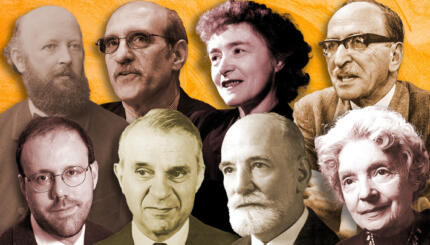I’ve often expressed my belief that Jewish triumphalism (be it biblical or theological) is dangerous because it will likely lead to demeaning the other and, quite possibly, violence.
Reading Menachem Kellner’s Must a Jew Believe Anything? I came across a passage in which he articulates a similar sentiment. Kellner arrives at his idea in analyzing two contrasting tendencies in Jewish thought: those who believe that Jews are essentially different (and better) than non-Jews vs. those who reject any inherent differentiation between Jews and gentiles.
Kellner identifies the former position with Judah Halevi and, later, the Zohar; while Maimonides supports the second position.
Here on MJL, Rabbi Jill Jacobs has similarly distinguished the two:
For Halevi, the Jews are inherently different from other people. In his most famous work, the Kuzari, he introduces the idea that, at the time of the creation of human beings, God instilled in Adam a certain divine quality, which then passed to Adam’s son Seth and then, through Seth’s line, to the entire Jewish people (1:95). This divine essence, according to Halevi, is unlinked to any human behavior. A Jew who rejects Torah law cannot lose this essence, and a non-Jew who observes the commandments cannot acquire it.
In contrast, Maimonides, in accordance with the rabbinic understanding of chosenness as the result of human action, describes Abraham as a philosopher who is “chosen” only because he discovers God. (MORE)
Again, for Kellner (and I’d agree) there are practical — potentially, political — ramifications to this debate:
It is a short step from maintaining that Jews are essentially different from non-Jews to affirming that Jews are inherently superior to non-Jews…
It is also a short step from the conviction that Jews are essentially unlike non-Jews to the position that non-Jews can never be trusted and that they bear within them an ineradicable hatred for Jews…In the context of an Israel seeking to live at peace with its neighbours, Jews holding this ‘essentialist’ view of the nature of the Jewish people more than occasionally fall prey to the tendency to demonize our enemies and often incline to believe that any accommodation with these enemies will simply lead the latter to continue seeking our destruction…
When the essentialist vision of the Jewish people is coupled with the profound disdain for non-Jews found in the Zohar and other kabbalistic and hasidic texts, the temptation to reject any movement towards peace or accommodation on the part of Arabs as nothing more than a tactical step towards the ultimate goal of our destruction becomes almost overwhelming.
Kellner wrote his book before the onset of the second intifada, and though he may not have highlighted Arab peace overtures now, the message — that theological denigration can shape political points of view — remains true.
Torah
Pronunced: TORE-uh, Origin: Hebrew, the Five Books of Moses.
Zohar
Pronounced: ZOE-har, Origin: Aramaic, a Torah commentary and foundational text of Jewish mysticism.


